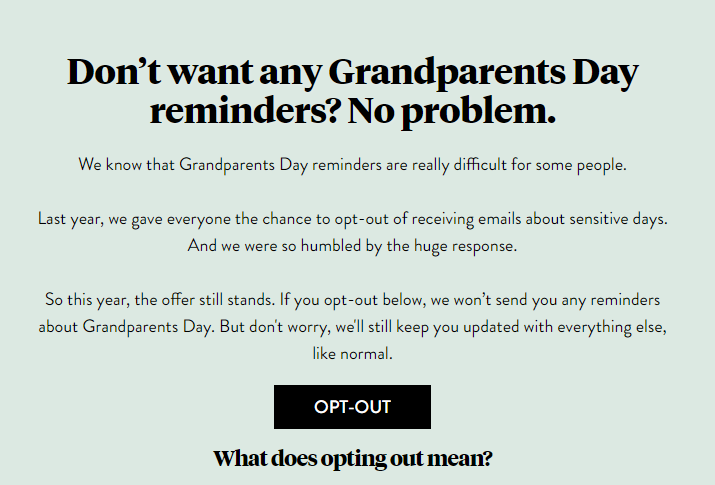Bloom & Wild’s pioneering Thoughtful Marketing Movement is leading the way to set a new standard for how brands communicate with, and consider, their customers.
The brands’ opt-out email campaigns, which began in 2019, show real empathy and commitment to really putting its customers first. It recognised that not all calendar events, such as Mother’s Day, are a cause for celebration for everyone. They’ve sensitively acknowledged that some customers may want to ignore those days and not be reminded of them with an inbox full of promotional messaging.
Bloom & Wild have given customers the chance to opt out of marketing emails for specific dates, events and campaigns and have extended this opt-out to the user experience on the website. This means that anyone who wishes not to see certain occasion campaigns won’t see anything about them on the website either, creating a friction-free user experience across all platforms
Marisa Thomas, Head of Brand at Bloom & Wild, talks about the brand’s ethos of spreading joy with flowers and how that means they also need to be sensitive to customers who aren’t sending flowers for joyful occasions. This sensitivity and care influences the brand’s tone of voice and all of its communications.
Putting customers first or being customer-centric is something pretty much all brands claim to do, but it’s rarely done with nuance, consideration or by empowering the consumer to make choices. Being able to opt-out of emails around sensitive occasions that might be triggering, without completely unsubscribing seems so simple, but it’s a real stroke of genius. A brand showing this kind of thoughtfulness is likely to endear customers who will feel seen and spoken to as individuals. Promoting customers’ feelings of wellbeing in this way is powerful and will really help brands stand out in a crowded marketplace and help them to build a loyal customer base.
Other brands are waking up to the power of thoughtful marketing and Bloom & Wild’s Thoughtful Marketing Movement is now a community of over 130 businesses. The flower brand has created an online space for other brand marketers to discuss, inspire, and help each other find ways to be more thoughtful in their communications. They have also published some great advice for brands on how to set up opt-out campaigns and communicating thoughtfully during a pandemic.
The idea of communicating thoughtfully isn’t new – Seth Godin talks about permission marketing way back in his 1999 book ‘Permission Marketing – Turning Strangers into Friends and Friends into Customers’, long before email marketing existed. Seth Godin underscores throughout the book that marketing messages should be anticipated, personal and relevant, and that is even more important twenty years down the line.
Godin’s book marked a change in marketing and advertising around that time – people had started to feel negatively toward brands shouting their messages at everybody indiscriminately, whether they were interested or not. Everybody watched the same few TV channels and listened to the same few radio stations, so everybody saw the same adverts, which were aimed at everyone and no one.
Marketing has become more and more permission based as consumers choose what media they give their attention to, and brands increasingly have to wait for the consumer to come to them, by opting in or following on social. This is the opposite of interruption marketing, which is exactly as it sounds – interrupting people to deliver (probably unwanted) marketing messages. Today, there is more media than anyone has time to consume, so people switch off, scroll down or unsubscribe if they don’t want a brand’s messages. Attention is an increasingly scarce and precious resource.
Godin talks about how subscriptions (to magazines, email newsletters or podcasts) exemplify permission – the consumer is committing to hearing from a brand regularly and it’s a two-way relationship.
Thoughtful marketing feels like the 2020 iteration of permission marketing but giving even more power to the consumer – to filter specific marketing messages on a personal level. Brands who want to remain resilient in a tough future marketplace should build campaigns around considerate communication and consumer choice.
So, how can you adopt permission and thoughtful marketing into your own communications? Here are a few tips.
– Make sure the way things are worded around sensitive occasions (e.g. Mother’s and Father’s Day) is considerate, empathetic, and not presumptuous
– Include opt-outs on emails that people may find difficult to receive
– Target, target, target! Segment your audience and only send people messages that are relevant to them
– Be patient and build a relationship with your customers over time, without pushing sales
– Make sure any online ads you run are targeted at a specific audience that will be receptive to them
– Don’t spam – it’s unlikely your customer wants to hear from your brand every day, so concentrate on quality over quantity in your comms
– Always make sure your unsubscribe option is clear so people can see it easily
Perhaps most importantly, think of the relationship with your customers as a two-way thing – engage them in a real conversation and provide real value to them through content marketing before trying to sell. As Seth Godin says, turn strangers into friends and friends into customers. It’s important to do the groundwork!
If you’d like to make your communications more thoughtful, chat to us at Honest. We are all about building good relationships with considerate campaigns and generous content.






